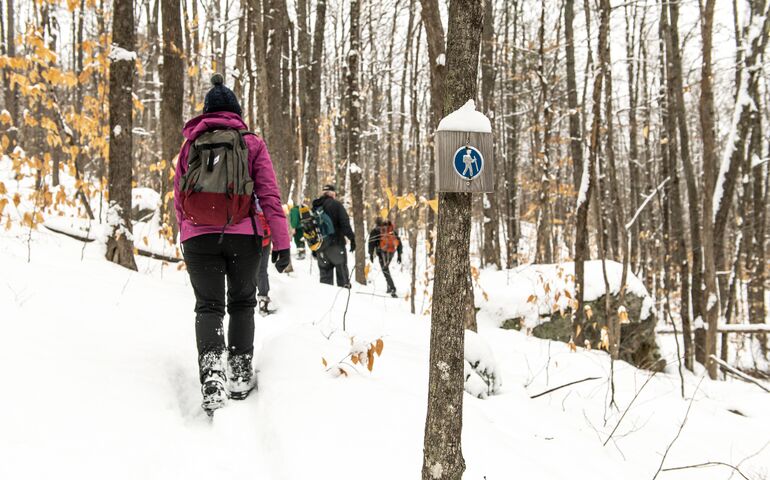Clean drinking water, recreation access drive 12,000-acre forest conservation in Oxford County
 Courtesy / Sebago Clean Waters
Preservation of forestland for recreational access was one of the drivers in the protection of over 12,000 acres of forestland in Oxford County.
Courtesy / Sebago Clean Waters
Preservation of forestland for recreational access was one of the drivers in the protection of over 12,000 acres of forestland in Oxford County.
The preservation of clean drinking water, as well as securing recreation opportunities and public access to nature, were primary drivers of a conservation easement for 12,268 acres of forestland in Oxford County.
The landowners, Mary McFadden and Larry Stifler, worked with Mahoosuc Land Trust, Sebago Clean Waters, and the Conservation Fund in partnership with the U.S. Department of Agriculture’s Natural Resources Conservation Service and Portland Water District to work out the easement.
The easement on the privately owned property will be held and stewarded by to Mahoosuc Land Trust, which is headquartered in Bethel.
The goal is to permanently protect the forestland from development and fragmentation, and preserve its ecological, recreational and water quality benefits for the community, according to a news release.
“This conservation easement is critical in assuring healthy drinking water for the greater Portland area for future generations,” Matt Walker, a Maine state conservationist with the Natural Resources Conservation Service, said in the release. “It’s a great example of the power of partner-driven approaches to conservation and agriculture challenges in Maine.”
McFadden and Stifler still own the property but donated the majority of the value of the conservation easement, Karen Young, partnership director of Sebago Clean Waters, told Mainebiz.
Funding was used primarily used to compensate the owners and also to support due diligence for the project, such as surveys and legal costs, she said.
The funds primarily came from a $496,476 award from the Portland Water District and a $1,860,700 award from the Natural Resource Conservation Service. Funding was also provided by Maine Community Foundation, the Nature Conservancy, Maine Mountain Collaborative and Sebago Clean Waters.
Sebago Clean Waters' funding came from a portion of a five-year award from the Natural Resources Conservation Service’s Regional Conservation Partnership Program Alternative Funding Arrangement program, which was authorized through the federal 2018 Farm Bill.
Young declined to cite the total value of the project.
Portland Water District, a founding member of Sebago Clean Waters, provided its award as part of its efforts to conserve the forests that filter the water flowing to the lake. The district’s support was made possible by a loan from the Maine Drinking Water State Revolving Loan Fund.
“Undeveloped forests treat our drinking water naturally and are a critical first step to providing clean, safe and affordable drinking water,” said Carrie Lewis, general manager of the Portland Water District. “As the local public water supplier, we are pleased to be able to join forces with Sebago Clean Waters, landowners and others to support conservation efforts like this. We all benefit from clean water.”
Decades of conservation
The conserved acreage neighbors Sebago Lake, a critical habitat for fish and wildlife, a destination for outdoor recreationalists and a source of clean drinking water for 1 in 6 Mainers.
McFadden and Stifler are married philanthropists who also established the Maine Mineral & Gem Museum in Bethel in 2012.
In the 1970s, the couple started acquiring parcels of forestland in Albany Township with a plan to conserve them for future generations. In a region where forest fragmentation is common, McFadden and Stifler said their goal was to “un-fragment” the property to keep it conserved and available for public recreation, and to establish numerous hiking and biking trails.
McFadden and Stifler donated the vast majority of the conservation easement’s value.
“Our donation on this land was to ensure it will be permanently conserved,” they said. “We and our three children are also pleased to protect the Sebago watershed and the extraordinary resources and beauty of this area for generations to come. We’re excited to share this land with the public and make this statement for conservation.”
Drinking water supply
The property is located in the territory of the Wabanaki people in what are now the towns of Waterford, Greenwood, Norway and Albany Township.
The land contains forests that the owners left to mature for 40 years, optimizing the forest’s ability to grow and sequester carbon and filter water. The landscape includes critical wildlife habitat, mountain views, nine ponds, approximately six miles of frontage on the Crooked River and intact forestlands.
Over 7,500 acres of the project are within the Crooked River watershed, and the easement project is called the Crooked River Headwaters. The Crooked River is the largest tributary to Sebago Lake. The lake is the primary drinking water supply for over 200,000 people in Greater Portland and one of only 50 public surface water supplies in the U.S. that requires no filtration before treatment.
Identified as a top conservation priority by Sebago Clean Waters, the property achieves 21% of the coalition’s goal to conserve 35,000 acres in the Sebago Lake watershed.
“This historic project marks a significant milestone in our efforts to conserve Sebago region forests to protect water quality, wildlife and the Maine way of life,” said Young.










0 Comments